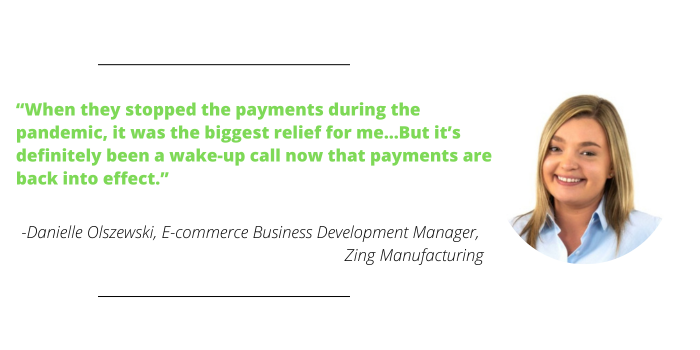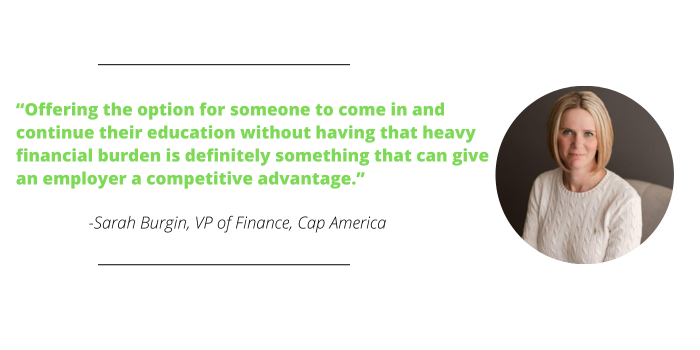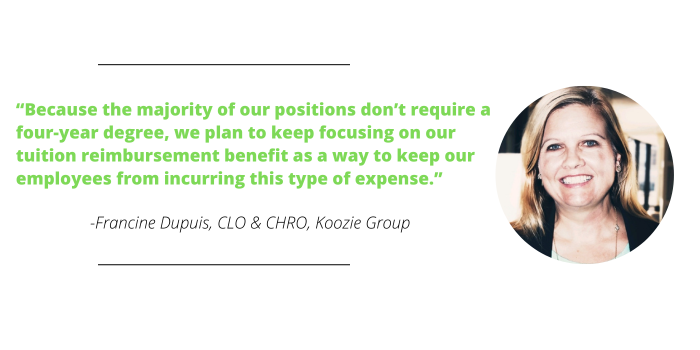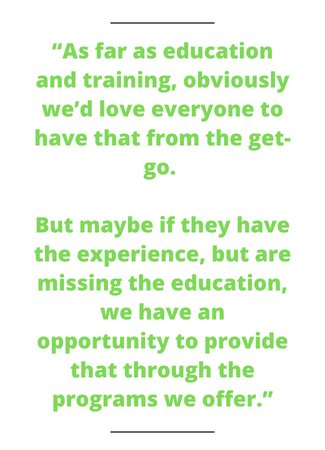Promo Pros Struggle With Student Loan Debt

Danielle Olszewski, e-commerce business development manager at Phoenix-based Zing Manufacturing (PPAI 517185, S7), is one of more than 40 million Americans who must resume their student loan payments this month after a three-and-a-half-year reprieve.
Although President Joe Biden has extended the payment freeze several times due to the COVID-19 pandemic, a provision in the Fiscal Responsibility Act of 2023 codified the plan to end the pause at the end of August. Interest on federal student loans began accruing again on September 1, and now Uncle Sam has come knocking for roughly 43.5 million borrowers – with the average borrower owing $37,787, according to Federal Reserve Bank of New York data.
“When they stopped the payments during the pandemic, it was the biggest relief for me,” says Olszewski, a 2021 PPB Rising Star. “I didn’t have this monthly bill and could focus on other major purchases. But it’s definitely been a wake-up call now that payments are back into effect.”
 Olszewski’s parents were concerned about the cost of higher education, but after emigrating from Poland in their 20s, their American dream was to work hard so their kids could go to college. “They tried to be as smart as possible about it, telling my sister and I we had to commute so we wouldn’t be stuck with a crazy amount of debt,” Olszewski says.
Olszewski’s parents were concerned about the cost of higher education, but after emigrating from Poland in their 20s, their American dream was to work hard so their kids could go to college. “They tried to be as smart as possible about it, telling my sister and I we had to commute so we wouldn’t be stuck with a crazy amount of debt,” Olszewski says.
Graduating from Monmouth University in 2015 with roughly $30,000 in student loan debt, Olszewski prioritized paying off the loans with the highest interest rate. Although that strategy has delayed home ownership for her and her husband, she’s now left owing only a little more than $4,000, which she’s leaning toward finishing off with a lump sum payment.
“We do have money in the bank and plan to talk to a financial advisor to see what our options are,” Olszewski says. “We want to start making larger life decisions and we’re thinking about having children. We should start saving now so they have something to help them in the future.”
‘The Only Option’
Meanwhile, Kelly Brown, director of marketing and operations at Grand Rapids, Michigan-based Green Giftz (PPAI 438899, D5), still has a ways to go.
A 2022 PPAI Rising Star, Brown owed more than $50,000 by the time she graduated from Grand Valley State University in 2014. After consistently paying on time and even throwing a little extra at the principal every so often, she currently owes about $10,000 in federal student loan debt and around $12,000 from a private loan that her parents took out in their name – even though they weren’t in favor of their children seeking higher education.
“My parents were looking at college as a huge expense, specifically how my older sister and I would be going into debt at such a young age,” Brown says. “At the same time, we had the foresight to know that if we didn’t go to college, it would be harder to get a degree and neither of us wanted to go into a skilled trade. College seemed like the only option. That’s just what you did. That’s what your advisors told you to do.”
 Now that payments have resumed, she expects to pay around $400 a month – on top of her mortgage, insurance, groceries and other expenses – for the next three to five years.
Now that payments have resumed, she expects to pay around $400 a month – on top of her mortgage, insurance, groceries and other expenses – for the next three to five years.
“Your student loan debt is this backpack you have to carry for the rest of your life until it’s gone,” says Brown, “It’s always looming over you. You’re reminded of it and how it limits things in your life like when you’re trying to get a home loan.”
How Can Promo Help?
Considering that the promotional products industry traditionally skews older, it’s not surprising that the roughly $1.8 trillion national student debt crisis hasn’t received as much attention as other pressing issues, such as sustainability.
- Distributors reported, on average, having just over a quarter (26.6%) of their workforce being under age 30, according to benchmarking data obtained by PPAI.
- Suppliers reported, on average, having less than a quarter (23.6%) of their workforce being under age 30, according to the benchmarking data.
The industry must attract more young people in order to survive and thrive. After all, it’s vital that promo firms recruit Millennials and Gen Zers who are more aligned with young consumers’ interests and preferences. To make the next generation of the workforce more inclined to enter – and remain – in promo, companies should be tailoring their perks and benefits to meet the needs of their future employees.
The Promotional Products Education Foundation (PPEF) is a good start. Since 1989, PPEF has awarded $3,347,000 in college scholarships to 1,788 industry employees and their children.
- For the 2023-24 school year, $320,500 in total scholarship money was awarded to 170 students (138 new recipients and 32 renewal recipients).
- PPEF is now accepting scholarship applications for the 2024-25 school year. The deadline to apply is March 15, 2024. Total amounts for the 2024-25 school year will be determined by January 2024.
Furthermore, helping employees pay off their student loan debt could be a differentiator for the industry. It’s an opportunity for promo firms to step up and give a lifeline that other companies aren’t.
- While nearly half (48%) of U.S. employers offer tuition assistance, only 8% provide student loan repayment assistance, according to the Society of Human Resource Management's 2023 Employee Benefits Survey.
“I wish there was some kind of support,” Olszewski says. “I never really took the perspective that this could be something your employer could help you with.”
Brown agrees, stressing that student loan assistance is highly desirable. “If I was a commissioned rep and the economy was fluctuating and I was uncertain what my income might look like on any given month, to know that I have some assistance with that debt would be huge,” she says. “If you’re late on those payments, that’s a big deal.”
Government Intervention
There was a chance that half of Brown’s debt would’ve been wiped away under Biden’s federal student loan forgiveness plan, which would’ve canceled $10,000 for borrowers making less than $125,000 annually and up to $20,000 for Pell Grant recipients – undergrads who display exceptional financial need.
However, the Supreme Court ruled against the plan at the end of June.
- The 6-3 majority said that the president didn’t have the authority to instruct the U.S. Secretary of Education to eliminate such a large amount of consumer debt without Congress’ authorization.
- The high court also said the plan would harm Missouri because it would’ve reduced profits at the Missouri Higher Education Loan Authority (MOHELA), one of the largest student loan servicers in the country.
“I can be upset, but I can’t change it,” Brown says. “It won’t magically go away. It would’ve been great if we had some forgiveness there, and that day might come, but right now, I have to pay this. You make it part of your monthly budget, cut corners where you can and move on.”
The Biden administration has since introduced other measures aimed at easing the burden for student loan borrowers, such as the SAVE plan (an improved income-driven repayment plan) and a 12-month “on-ramp” to repayment, running from October 1, 2023, to September 30, 2024. The latter is designed to avoid borrowers who miss monthly payments from being considered delinquent, reported to credit bureaus, placed in default or referred to debt collection agencies.
Employers Get Involved
Although these efforts will certainly help millions of borrowers, they’re not enough to benefit everyone. Therefore, without the government to rely on, many Americans are turning to the private sector for relief.
According to Betterment research:
- More than half (57%) of employees think their bosses should help them pay off their student debt and 85% said they'd leave their current job for one that offered more financial support for student loans.
- However, 86% of workers said they'd stick with a company for five years if it meant they could take advantage of a student loan repayment perk.
“It’s a good way to attract people,” says Sarah Burgin, vice president of finance at Fredericktown, Missouri-based Cap America (PPAI 111597, S10) – ranked the No. 11 supplier in this year’s PPAI 100.
 Cap America offers tuition reimbursement for employees, as does Proforma, American Solutions for Business, Orbus Visual Communications and Picnic Time Family of Brands, among other promo firms.
Cap America offers tuition reimbursement for employees, as does Proforma, American Solutions for Business, Orbus Visual Communications and Picnic Time Family of Brands, among other promo firms.
- Through 2025, employers can make tax-free payments of up to $5,250 per year to employees for eligible education expenses under Section 127 of the Internal Revenue Code.
Additionally, Cap America has a scholarship program for dependent children of its workforce.
“Employers are now in a position where they should be looking at themselves, asking what they can provide that makes them more attractive than another company,” Burgin says. “Offering the option for someone to come in and continue their education without having that heavy financial burden is definitely something that can give an employer a competitive advantage.”
Removing The Barrier To Entry
Koozie Group (PPAI 114187, S13) – ranked the No. 10 supplier in this year’s PPAI 100 – has had 22 employees take advantage of its tuition reimbursement benefit this year, according to Francine Dupuis, chief legal officer and chief human resources officer at the Tampa, Florida-based company.
“Because the majority of our positions don’t require a four-year degree, we plan to keep focusing on our tuition reimbursement benefit as a way to keep our employees from incurring this type of expense,” Dupuis says.
 Other promo firms have also shifted their way of thinking, no longer demanding that employees spend four or more years cracking the books and racking up debt. For example, Brown says Green Giftz no longer requires a four-year degree from its job applicants. Instead, the company focuses on candidates’ skills, personality traits and experience.
Other promo firms have also shifted their way of thinking, no longer demanding that employees spend four or more years cracking the books and racking up debt. For example, Brown says Green Giftz no longer requires a four-year degree from its job applicants. Instead, the company focuses on candidates’ skills, personality traits and experience.
“In our industry, experience in an actual job is way more beneficial than whatever your college degree is in,” Brown says. “Certainly, college provides you with life experiences and a built-in network that you can use in your career, but as far as it actually leading to a job, your experience in your internship, a job in college or what you’ve done after is way more beneficial. That’s coming from somebody that looks at resumes and hires people.”
Olszewski agrees, arguing that some of the hardest workers come from the retail or even the fitness space. “You can find talent in other areas without them having a bachelor’s degree,” she says. “That’s why I love our industry – we’re very welcoming to people with different backgrounds.”
Burgin says that higher education is typically preferred, but not required for positions at Cap America. “Since COVID, the market has been more competitive for talent and people have choices they didn’t necessarily have before,” Burgin says. “Finding the right candidate is definitely challenging. We’re always looking for a great fit culturally as well, so we dive into that a little bit deeper, making sure the candidate is the right fit.”

“As far as education and training,” she adds, “obviously we’d love everyone to have that from the get-go. But maybe if they have the experience, but are missing the education, we have an opportunity to provide that through the programs we offer.”
Instead of standard college courses, Cap America is now looking at different certificates and online programs that are less of a time commitment as an alternative way for employees to further their education. Burgin says the company has looked into electrical and welding certifications, even sending some workers to take a course in sewing machine operation and repair.
“I’m proud that we continue to have an open mind as far as how we’re helping employees enhance their careers,” Burgin says.

